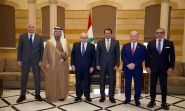
The ‘Lebanese Forces’ (LF) party said Tuesday that Hezbollah is to blame for Israel’s repeated incursions into Lebanon and for undermining the country’s sovereignty.
In a statement released by its media office, the LF was responding to remarks made a day earlier by Hezbollah’s Secretary-General Sheikh Naim Qassem.
It said the government’s decisions of August 5 and 7, affirming the state’s monopoly on arms, represent “the first step toward recovering sovereignty,” which, it argued, has long been eroded by Hezbollah’s arsenal.
Furthermore, the LF accused Hezbollah of “usurping the state’s strategic decision-making, preventing the establishment of a true state, and dragging Lebanon into wars serving its own interests and those of Iran.” It stressed that sovereignty “has a clear and obvious definition: only the state holds the monopoly over force and decision-making,” adding that “the one violating Lebanese sovereignty is Hezbollah itself.”
The LF also argued that without Hezbollah, “Israel would never have entered Lebanon in July 2006,” nor returned after what the group termed the “support war.” Instead, the LF said, relations between Lebanon and Israel would have been governed by the Taif Accord’s armistice provisions, with Israel confined to Lebanon’s internationally recognized borders.
The statement also accused Hezbollah of weakening the Lebanese Army, saying the group “has never wanted the army to play a role, nor the state of Lebanon to rise.” It added that the resistance Hezbollah defends “is what handed Lebanon over to Israel,” exposing the country to repeated military targeting while “destroying Lebanon and displacing its people.”
The LF hailed the government’s recent stance against illegal arms, calling it “the clearest and most honorable decision” taken in decades, after years in which Hezbollah’s weapons turned Lebanon into “a battlefield of chaos, wars, death, destruction, and ruin.”
Concluding its statement, the LF said “the real red line is Lebanon, and what is forbidden is for Iran to cross it. Iran should mind its own affairs, while Lebanon is fully capable of minding its own.”



Comments